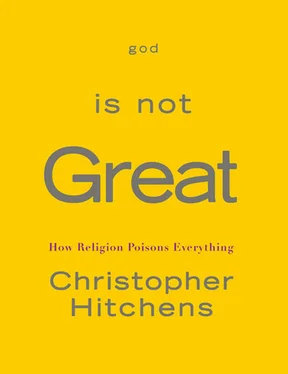Thus, though I dislike to differ with such a great man, Voltaire was simply ludicrous when he said that if god did not exist it would be necessary to invent him. The human invention of god is the problem to begin with. Our evolution has been examined “backward,” with life temporarily outpacing extinction, and knowledge now at last capable of reviewing and explaining ignorance. Religion, it is true, still possesses the huge if cumbersome and unwieldy advantage of having come “first.” But as Sam Harris states rather pointedly in The End of Faith , if we lost all our hard-won knowledge and all our archives, and all our ethics and morals, in some Márquez-like fit of collective amnesia, and had to reconstruct everything essential from scratch, it is difficult to imagine at what point we would need to remind or reassure ourselves that Jesus was born of a virgin.
Thoughtful believers can take some consolation, too. Skepticism and discovery have freed them from the burden of having to defend their god as a footling, clumsy, straws-in-the-hair mad scientist, and also from having to answer distressing questions about who inflicted the syphilis bacillus or mandated the leper or the idiot child, or devised the torments of Job. The faithful stand acquitted on that charge: we no longer have any need of a god to explain what is no longer mysterious. What believers will do, now that their faith is optional and private and irrelevant, is a matter for them. We should not care, as long as they make no further attempt to inculcate religion by any form of coercion.
CHAPTER SEVEN
Revelation: The Nightmare of the “Old” Testament
Another way in which religion betrays itself, and attempts to escape mere reliance on faith and instead offer “evidence” in the sense normally understood, is by the argument from revelation. On certain very special occasions, it is asserted, the divine will was made known by direct contact with randomly selected human beings, who were supposedly vouchsafed unalterable laws that could then be passed on to those less favored.
There are some very obvious objections to be made to this. In the first place, several such disclosures have been claimed to occur, at different times and places, to hugely discrepant prophets or mediums. In some cases—most notably the Christian—one revelation is apparently not sufficient, and needs to be reinforced by successive apparitions, with the promise of a further but ultimate one to come. In other cases, the opposite difficulty occurs and the divine instruction is delivered, only once, and for the final time, to an obscure personage whose lightest word then becomes law. Since all of these revelations, many of them hopelessly inconsistent, cannot by definition be simultaneously true, it must follow that some of them are false and illusory. It could also follow that only one of them is authentic, but in the first place this seems dubious and in the second place it appears to necessitate religious war in order to decide whose revelation is the true one. A further difficulty is the apparent tendency of the Almighty to reveal himself only to unlettered and quasi-historical individuals, in regions of Middle Eastern wasteland that were long the home of idol worship and superstition, and in many instances already littered with existing prophecies.
The syncretic tendencies of monotheism, and the common ancestry of the tales, mean in effect that a rebuttal to one is a rebuttal to all. Horribly and hatefully though they may have fought with one another, the three monotheisms claim to share a descent at least from the Pentateuch of Moses, and the Koran certifies Jews as “people of the book,” Jesus as a prophet, and a virgin as his mother. (Interestingly, the Koran does not blame the Jews for the murder of Jesus, as one book of the Christian New Testament does, but this is only because it makes the bizarre claim that someone else was crucified by the Jews in his place.)
The foundation story of all three faiths concerns the purported meeting between Moses and god, at the summit of Mount Sinai. This in turn led to the handing down of the Decalogue, or Ten Commandments. The tale is told in the second book of Moses, known as the book of Exodus, in chapters 20–40. Most attention has been concentrated on chapter 20 itself, where the actual commandments are given. It should not perhaps be necessary to summarize and expose these, but the effort is actually worthwhile.
In the first place (I am using the King James or “Authorized” Version: one among many rival texts laboriously translated by mortals either from Hebrew or Greek or Latin), the so-called commandments do not appear as a neat list of ten orders and prohibitions. The first three are all variations of the same one, in which god insists on his own primacy and exclusivity, forbids the making of graven images, and prohibits the taking of his own name in vain. This prolonged throat-clearing is accompanied by some very serious admonitions, including a dire warning that the sins of the fathers will be visited on their children “even unto the third and fourth generation.” This negates the moral and reasonable idea that children are innocent of their parents’ offenses. The fourth commandment insists on the observance of a holy Sabbath day, and forbids all believers—and their slaves and domestic servants—to perform any work in the course of it. It is added that, as was said in the book of Genesis, god made all the world in six days and rested on the seventh (leaving room for speculation as to what he did on the eighth day). The dictation then becomes more terse. “Honor thy father and thy mother” (this not for its own sake but in order “that thy days may be long upon the land which the Lord thy God giveth thee”). Only then come the four famous “shalt nots,” which flatly prohibit killing, adultery, theft, and false witness. Finally, there is a ban on covetousness, forbidding the desire for “thy neighbor’s” house, manservant, maidservant, ox, ass, wife, and other chattel.
It would be harder to find an easier proof that religion is man-made. There is, first, the monarchical growling about respect and fear, accompanied by a stern reminder of omnipotence and limitless revenge, of the sort with which a Babylonian or Assyrian emperor might have ordered the scribes to begin a proclamation. There is then a sharp reminder to keep working and only to relax when the absolutist says so. A few crisp legalistic reminders follow, one of which is commonly misrendered because the original Hebrew actually says “thou shalt do no murder.” But however little one thinks of the Jewish tradition, it is surely insulting to the people of Moses to imagine that they had come this far under the impression that murder, adultery, theft, and perjury were permissible. (The same unanswerable point can be made in a different way about the alleged later preachings of Jesus: when he tells the story of the Good Samaritan on that Jericho road he is speaking of a man who acted in a humane and generous manner without, obviously, ever having heard of Christianity, let alone having followed the pitiless teachings of the god of Moses, who never mentions human solidarity and compassion at all.) No society ever discovered has failed to protect itself from self-evident crimes like those supposedly stipulated at Mount Sinai. Finally, instead of the condemnation of evil actions, there is an oddly phrased condemnation of impure thoughts. One can tell that this, too, is a man-made product of the alleged time and place, because it throws in “wife” along with the other property, animal, human, and material, of the neighbor. More important, it demands the impossible: a recurrent problem with all religious edicts. One may be forcibly restrained from wicked actions, or barred from committing them, but to forbid people from contemplating them is too much. In particular, it is absurd to hope to banish envy of other people’s possessions or fortunes, if only because the spirit of envy can lead to emulation and ambition and have positive consequences. (It seems improbable that the American fundamentalists, who desire to see the Ten Commandments emblazoned in every schoolroom and courtroom—almost like a graven image—are so hostile to the spirit of capitalism.) If god really wanted people to be free of such thoughts, he should have taken more care to invent a different species.
Читать дальше












